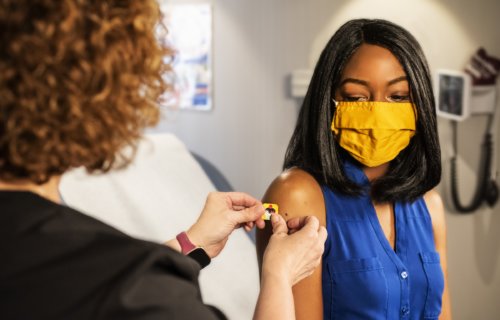CHAMPAIGN, Illinois — Women may experience heavier bleeding during their period if they’ve recently received a COVID-19 vaccine. A new report from the University of Illinois at Urbana-Champaign warns that menstrual changes are more likely to happen in the first two weeks after getting vaccinated.
Menstrual changes were not one of the listed side effects of the COVID-19 vaccine. That’s mainly because scientists did not go around asking about one’s period, so the side effect was largely ignored. Women were also largely gaslighted during the early days of the vaccination campaign. According to Kathryn Clancy, a professor of anthropology at the University of Illinois Urbana-Champaign and study author, many doctors dismissed patients’ concerns over menstrual changes post-vaccination. Vaccines such as Hepatitis B and HPV have caused menstrual changes in the past, however. One possible reason is that the vaccines could increase the number of inflammatory pathways in the body.
“We suspect that for most people the changes associated with COVID-19 vaccination are short-term, and we encourage anyone who is worried to contact their doctor for further care,” says Katharine Lee, an anthropology professor at Tulane University, in a statement. “We want to reiterate that getting the vaccine is one of the best ways to prevent getting very sick with COVID, and we know that having COVID itself can lead not only to changes in periods, but also hospitalization, long COVID, and death.”
The researchers surveyed over 35,000 people on their side effects after vaccination. Specific questions in the survey focused on a person’s reproductive history and menstrual bleeding. They excluded data from survey respondents who had COVID-19 in the past as the infection itself is associated with changes in menstruation. They also excluded answers from people 45 to 55 years to avoid confusing menstrual changes with perimenopause.
“We focused our analysis on those who regularly menstruate and those who do not currently menstruate but have in the past,” explains Clancy. “The latter group included postmenopausal individuals and those on hormonal therapies that suppress menstruation, for whom bleeding is especially surprising.”
A total of 42.1% of survey respondents said they had a heavier flow after getting the COVID-19 vaccine. While some experienced it in the first week post-vaccination, most saw changes 8-14 days after. Although, about 43.6% of people reported no changes to their cycle, and 14.3% saw either no change or a lighter flow.
Other factors appeared to come into play as well. Women who had been pregnant reported heavier bleeding after vaccination. Most non-menstruating premenopausal respondents on hormone treatment had bleeding after the vaccine. Over 70% of people used long-acting reversible contraception, and 38.% in the middle of gender-affirming hormone treatments reported menstrual changes.
“Unexpected breakthrough bleeding is one of the early signs of some cancers in post-menopausal people and in those who use gender-affirming hormones, so experiencing it can make people worry and require expensive and invasive cancer-screening procedures,” says Lee. “We’d love to see future vaccine testing protocols incorporate questions about menstruation that go beyond screening for pregnancy. Menstruation is a regular process that responds to all kinds of immune and energetic stressors, and people notice changes to their bleeding patterns, yet we don’t tend to talk about it publicly.”
The study is published in Science Advances.
